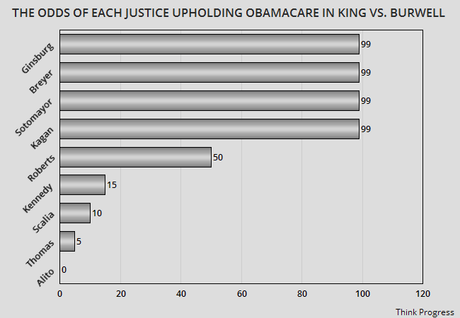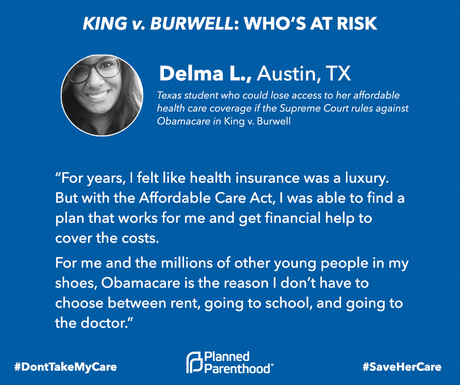
The Supreme Court will hear arguments on the constitutionality of the government subsidies that help many people buy health insurance on Wednesday (King vs. Burwell). If the subsidies (those given thru the federal insurance exchange) are ruled unconstitutional, it means as many as 8 million Americans could lose their health insurance (because without the subsidies they could no longer afford that insurance). The question now is whether the court will vote the subsidies are constitutional or not.
If we go by what party the justices belonged to when appointed, the chances are good that the subsidies would be declared unconstitutional -- because we have five Republicans and four Democrats on the court. But while that is the best predictor of how justices will vote, it does not always work out that way.
Take for instance, Chief Justice Roberts. Although a Republican, Roberts was the swing vote in the original Obamacare case, and joined the Democrats in a 5-4 vote declaring Obamacare was constitutional. Could he do the same thing again?
Think Progress thinks that could happen. At least it has a 50-50 chance of happening (see the chart above). They looked at the past votes of all the justices, and came up with odds on how each justice is likely to vote in King vs. Burwell. They believe that four justices (Ginsburg, Breyer, Sotomayor, and Kagan) have 99% odds of voting to uphold the subsidies, while four justices (Scalia, Alito, Kennedy, and Thomas) have odds ranging from 0% to 15% that they will vote against the subsidies. That leaves Roberts, who has a 50% chance of voting either way.
In other words, it's nail-biting time for the millions who would lose their health insurance.
If you would like to know more about just what this case is about, Steven Brill has written an excellent article on it for Reuters. Here is some of what he had to say:
Congressional intent will be hotly debated in the U.S. Supreme Court this Wednesday in King v. Burwell, the latest litigation vehicle being deployed by opponents of Obamacare. “Congress could not have chosen clearer language to express its intent to limit subsidies to state exchanges,” the plaintiffs, represented by the Competitive Enterprise Institute, argue in their brief. That is fiction. Provable fiction. Congress knew exactly what it wanted to do when it passed the Affordable Care Act in 2010, and contrary to the plaintiffs’ claim, that included wanting subsidies for buying health insurance on the Obamacare exchanges to be available to all citizens, even those residing in the 36 states that did not set up their own exchanges, instead relying on the exchange set up by the federal government. I’m a reporter. I hate to take sides. And I certainly didn’t in what has been widely reviewed as my even-handed treatment of the merits and demerits of Obamacare in my recently published book about the broken American healthcare system and how Obamacare was conceived and implemented to fix it. But this is one of those issues where reporters err if they write an “on the one hand, on the other hand” story that creates patently false equivalency. As I wrote in a November column for Reuters, soon after the Supreme Court’s surprising decision to take this case, disputes that end up at the court are usually about the interpretation of the Constitution and statutes, not about facts. The press is mostly left to provide the basic background of the dispute and then explain the positions of the lawyers on each side. But at its core, this case, as with any about congressional intent, is about knowable facts, not about the lawyers’ views of the law. King v. Burwell hinges on one poorly worded sentence cited by the plaintiffs in a 961-page law that seems to negate a linchpin of that law — the availability of those subsidies to middle-class families so they can buy health insurance. The question is whether that sentence should somehow outweigh all the other provisions in the law that contradict it. And when the meaning of a federal law ends up being disputed in court because the wording is vague or internally contradictory, the dispute turns on the kinds of facts journalists are used to digging out. That’s because judges are supposed to figure out what the legislators intended the law to mean and to do. I know what the legislators intended because in researching my book, I interviewed pretty much everyone involved in the conception and writing of the law. Moreover, I did that long before King v. Burwell had become the Obamacare opponents’ favorite new weapon, which means that those opponents had no reason to spin the fairytale that Congress did not intend for those subsidies to go to the millions of Americans signing up on the federally run exchange. At the time, no one had a dog in a fight over congressional intent, because there was no fight. I also reviewed reams of internal emails and memos generated by congressional staffers working for both Democrats and Republicans. In no document from start to finish, in a legislative process that spanned more than two years, is there even a hint of anything but the unambiguous assumption that the law, whose first section is titled “Quality, Affordable Health Care for All Americans,” would indeed provide these insurance subsidies for all Americans who needed them. In short, I had a catbird seat for doing exactly that kind of fact-based reporting that anyone judging a case like this — reporters, as well as judges — should do. But I didn’t appreciate it because neither I nor the people I was interviewing had any expectation that this case would become something the Supreme Court would take seriously. Indeed, when I mentioned the case to several of those sources during the spring and summer of last year, all of them – Democrats and Republicans – did some version of an eye roll. This is why there is only scant mention of the case in my book, the draft of which was completed before the court took the case. I’ve now gone back and looked at my notes and can report that I interviewed 21 congressional staffers and members last year in my effort to reconstruct the day-by-day narrative of how Obamacare happened. None ever mentioned the possibility that the subsidies did not apply to the states in the federal exchange. On the contrary, everything they told me — and all of the contemporaneous emails and other internal documents I reviewed — assumed that the federal exchange would simply be a substitute for a state exchange if a state decided not to launch its own, and that the same rules would apply. That is consistent with the instructions Democratic and Republican staff members gave to the Congressional Budget Office when they asked it to “score” (estimate the cost of) various drafts of the law, including the final version.


